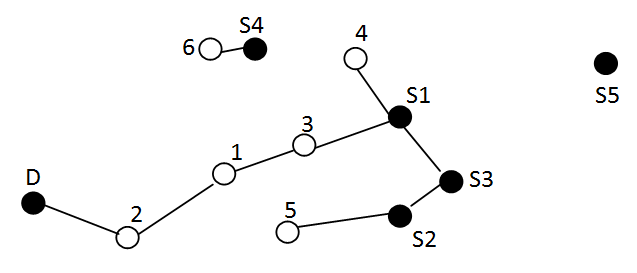[Date Prev][Date Next][Thread Prev][Thread Next][Date Index][Thread Index]
[Fwd: Inquiry about using GNU MathProg]
|
From: |
Andrew Makhorin |
|
Subject: |
[Fwd: Inquiry about using GNU MathProg] |
|
Date: |
Sun, 02 Oct 2022 22:20:56 +0300 |
-------- Forwarded Message --------
Date: Sun, 2 Oct 2022 19:14:51 +0000 (UTC)
Subject: Inquiry about using GNU MathProg
Cc: basma Mamdouh <bbasioni@yahoo.com>
To: help-glpk@gnu.org <help-glpk@gnu.org>
From: basma mohamed <bbasioni@yahoo.com>
Dear GLPK developers and helpers,
After greeting,
I recently started to use lp_solve for optimizing the protocols of
wireless networks using GNU MathProg “.mod” files.
I have a question about how I can use these tools to define a set or a
parameter
contains the paths originated from each source "S" whether it is a
complete path to destination "D" or not, with the ability to reach each
element: each path, each link, each vertex .
for example:
The set value would be the paths of S1, S2, and S3 in the form of 2-
tuples representing
links constituting the path, such that:
{
{ (S1,4) }, { (S1,S3), (S3, S2), (S2,5) }, { (S1,3), (3,1), (1,2), (2,D)
} , { (S2,5) }, { (S2,S3), (S3, S1), (S1,4) }, { (S2,S3), (S3, S1),
(S1,3), (3,1),
(1,2), (2,D) }, { (S3,S2), (S2,5)}, { (S3,S1), (S1,4) }, { (S3,S1),
(S1,3), (3,1),
(1,2), (2,D) }, { (S4,6) } }
I put all the graph edges in this set:
set Edges{i in Nodes , j in Nodes: sqrt( abs(xCoord[i] - xCoord[j]) *
abs(xCoord[i]
- xCoord[j]) + abs(yCoord[i] - yCoord[j]) * abs(yCoord[i] - yCoord[j])
), <=
range, != 0 };
Where Nodes is the union of all sets representing the graph vertices
IDs,
and xCoord and yCoord are the sets contain their coordinates.
Could you help me achieve this; In general, i would appreciate it if you
mention examples and tutorials for using GNU MathProg in Networks
optimization .
Thank you in advance ,
Respectfully

- [Fwd: Inquiry about using GNU MathProg],
Andrew Makhorin <=
